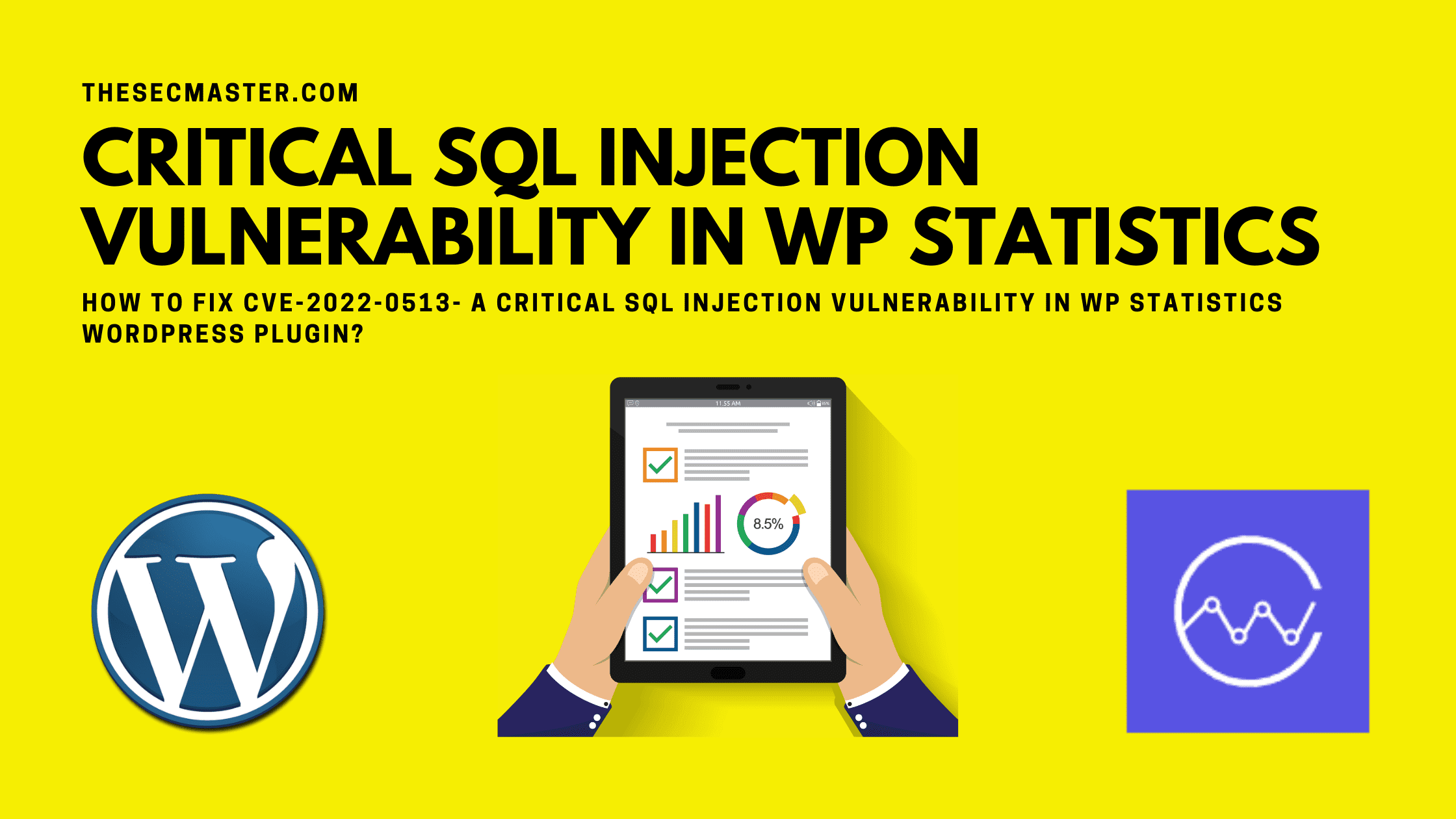Table of Contents
CVE-2022-0513- Fix The Critical SQL Injection Vulnerability In WP Statistics WordPress Plugin
OkayCybersecurity researcher Cyku Hong from DEVCORE disclosed a SQL Injection vulnerability in WP Statistics, a popular WordPress plugin created to display website statistics. The flaw is cracked under CVE-2022-0513 ID and has a score of 9.8 out of 10 in the CVSS scoring system. The flaw is considered critical because successful exploitation of this vulnerability will allow unauthenticated attackers to extract sensitive information like password hashes and secret keys from the database by executing arbitrary SQL queries appending to an existing SQL query. This post is worth reading as we have covered how to fix this critical SQL Injection Vulnerability in WP Statistics WordPress Plugin.
WP Statistics WordPress Plugin:
WP Statistics is a popular WordPress plugin developed to give comprehensive statistics information of the WordPress website. This helps website owners to keep track of visitor data such as IP address, Referring Site, Browser, Search Engine, OS, Country, and City. Some of the stunning features it offers to its users are:
Graphs and Visual Statistics
Hits Time-Based Filtering
Statistics based on Categories, Tags, and Writers
Additional widget Support for showing Statistics
Data Export option in TSV, XML, and CSV formats
Email Statistics reporting
Real-time statistics
Summary Of CVE-2022-0513 Vulnerability:
Due to privacy factors, the plugin is designed to store all the data locally on the server. The plugin uses SQL queries to retrieve information from the database and supply the data to its dashboards. The vulnerability lice in the insecure implementation of the SQL queries related to Record Exclusions functions. According to the Wordfence report, this vulnerability can become exploitable when the Record Exclusions” feature is enabled.
The successful exploitation of this vulnerability will enable unauthenticated attackers to use a Time-Based blind SQL Injection approach to extract information from the database by executing arbitrary SQL queries appending to an existing SQL query. An attacker can exfiltrate sensitive information such as password hashes and secret keys from the database and use them to extend his attacks.
| Associated CVE ID | CVE-2022-0513 |
| Description | Unauthenticated Blind SQL Injection in WP Statistics WordPress Plugin |
| Associated ZDI ID | – |
| CVSS Score | 9.8 Critical |
| Vector | CVSS:3.1/AV:N/AC:L/PR:N/UI:N/S:U/C:H/I:H/A:H |
| Impact Score | – |
| Exploitability Score | – |
| Attack Vector (AV) | Network |
| Attack Complexity (AC) | Low |
| Privilege Required (PR) | None |
| User Interaction (UI) | None |
| Scope | Unchanged |
| Confidentiality (C) | High |
| Integrity (I) | High |
| availability (a) | High |
How To Fix CVE-2022-0513- A Critical SQL Injection Vulnerability In WP Statistics WordPress Plugin?
The flaw affects all the versions below 13.1.5. So the users of the WP Statistics plugin are recommended to upgrade their plugin to v13.1.5 as the flaw has been fully patched in v13.1.5.
In addition to this, we always recommend using security plugins like Wordfence, which will protect your WordPress website from being the victim of cyberattacks. Wordfence does not just protect your website. They also help in the recovery process in case of compromise. They have different plans for different users. They have a free plan for beginners for those who want to try for free. Feel free to check out their plans on their website.
How To Upgrade The WP Statistics WordPress plugin?
It is simple and easy to upgrade plugins on the WordPress platform.
Log in to WordPress admin
Navigate to Plugins on the left-hand side options.
Select the WP Statistics plugin
Click on the update plugin link.
WordPress allows admin users to enable auto-update features as well. We recommend trying this feature as it doesn’t need your intervention to update the plugin.
We hope this post would help you know about How to Fix the Critical SQL Injection Vulnerability in WP Statistics WordPress Plugin. Thanks for reading this threat post. Please share this post and help to secure the digital world. Visit our social media page on Facebook, LinkedIn, Twitter, Telegram, Tumblr, & Medium and subscribe to receive updates like this.
You may also like these articles:
Arun KL
Arun KL is a cybersecurity professional with 15+ years of experience in IT infrastructure, cloud security, vulnerability management, Penetration Testing, security operations, and incident response. He is adept at designing and implementing robust security solutions to safeguard systems and data. Arun holds multiple industry certifications including CCNA, CCNA Security, RHCE, CEH, and AWS Security.
